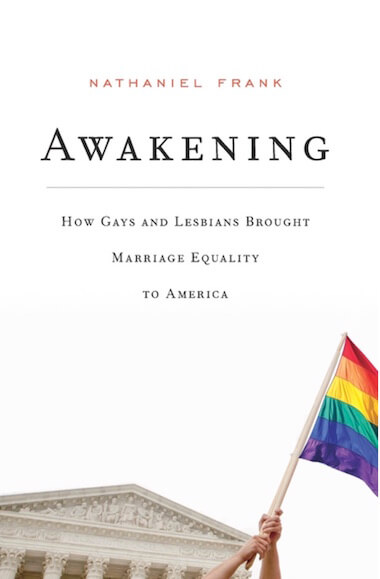One of the first federal court decisions to apply last June’s Supreme Court DOMA ruling came quickly the following month, when US District Judge Timothy S. Black ordered Ohio to recognize a Maryland same-sex marriage in approving data on a death certificate. That order was followed up by a detailed opinion in December finding that Ohio’s refusal to recognize same-sex marriages performed in other states violates the 14th Amendment, which requires states to provide “equal protection of the laws” and protects the right of married couples to “stay married” when they cross state lines.
Now a second federal judge, John G. Heyburn II, of the Western District of Kentucky, has followed Black’s lead. On February 12, Heyburn ordered that Kentucky recognize same-sex marriages contracted in other states and Canada. And, on the same day Heyburn ruled, married same-sex couples living in Missouri and Louisiana filed their own lawsuits, seeking to have their state governments recognize their marriages from elsewhere.
In none of these cases are the plaintiffs seeking a ruling that unmarried same-sex couples in their states have a right to marry.
District court builds on post-DOMA pattern in suit brought by couples married elsewhere
However, most of the same legal arguments would be relevant in cases seeking the ability to marry outright. Judge Heyburn left little doubt how that would be resolved. “The Court was not presented with the particular question whether Kentucky’s ban on same-sex marriage is constitutional,” he observed. “However, there is no doubt that [last summer’s DOMA ruling] and this Court’s analysis suggest a possible result to that question.”
Louisville attorneys Dawn Elliott and Shannon Fauver represent the four plaintiff couples, two of which are raising children together, and on February 14, Valentine’s Day, the two attorneys filed suit on behalf of two gay couples hoping to marry in Kentucky.
The lawsuit already decided challenged a 1998 law and a 2004 state constitutional amendment, both denying recognition to same-sex marriages. The constitutional amendment, part of a nationwide strategy by the Bush re-election campaign to pull conservative voters to the polls, passed with just under three-quarters of the vote.
For Heyburn, the amendment’s popularity was irrelevant, because the constitutional issue was clear and easily resolved in light of recent federal and state court rulings on marriage equality. “Nine state and federal courts have reached conclusions similar to those of this Court,” he wrote. “After the Massachusetts Supreme Judicial Court led the way by allowing same-sex couples to marry, five years later the Connecticut Supreme Court reached a similar conclusion regarding its state constitution on equal protection grounds. Other courts soon began to follow. Over the last several months alone, three federal district courts have issued well-reasoned opinions supporting the rights of non-heterosexual persons to marriage equality in similar circumstances. Indeed, to date, all federal courts that have considered same-sex marriage rights post-Windsor [the DOMA case] have ruled in favor of same-sex marriage rights. This Court joins in general agreement with their analyses.”
Heyburn, nevertheless, took a conservative route to his conclusion. While conceding the case might demand “heightened scrutiny” –– under which sexual orientation is considered a “suspect classification” for which any discriminatory policy must be backed up by a compelling justification –– he was penned in by two facts. As recently as 2012, the Sixth Circuit Court of Appeals, to which his decision would be appealed, ruled that sexual orientation discrimination claims are not subject to heightened scrutiny. And the Supreme Court, in last year’s DOMA case, did not clearly say it was applying heightened scrutiny and thereby superseding the Sixth Circuit precedent.
Those obstacles did not matter, the judge found, since Kentucky’s refusal to recognize same-sex marriages was not supported by any constitutionally acceptable justification. Despite the fact that the DOMA decision acknowledged that states have the primary authority to establish marriage laws, its “reasoning establishes certain principles that strongly suggest the result” in the Kentucky case, Heyburn concluded.
Whether Kentucky’s ban on recognizing legal same-sex marriages “demonstrates animus against same-sex couples may be debatable,” he wrote, but it is clearly aimed at discriminating against them. The Supreme Court’s DOMA “analysis would seem to command that a law refusing to recognize valid out-of-state same-sex marriages has only one effect: to impose inequality.”
He continued, “From this analysis, it is clear that Kentucky’s laws treat gay and lesbian persons differently in a way that demeans them. Absent a clear showing of animus, however, the Court must still search for any rational relation to a legitimate government purpose.” In that search, however, Heyburn turned up empty-handed.
The only justification presented by Kentucky officials was “preserving the state’s institution of traditional marriage,” which Heyburn found totally insufficient, pointing out that many traditional laws have been invalidated by the courts in the name of equal protection, citing as a prime example the 1967 Supreme Court ruling that struck down laws against interracial marriage. Moral disapproval, the Supreme Court has held in three gay rights rulings dating back to 1996, is an impermissible basis for discriminatory laws and government policies.
Heyburn noted that the state hadn’t even bothered to make arguments that marriage encourages “responsible procreation” by heterosexuals and “optimal child-rearing” in society –– though an amicus brief from a right-wing group did. “The State, not surprisingly, declined to offer these justifications, as each has failed rational basis review in every court to consider them” in the wake of the DOMA ruling and by most courts prior to it, the judge wrote.
In fact, Heyburn observed, the Supreme Court, in the DOMA case, found that children of same-sex couples are “humiliated” by the government’s denial of marriage rights to their parents.
Heyburn seemed well aware that many Kentuckians might be uncomfortable with his ruling. Regarding religious objections to marriage equality, he wrote, “Assigning a religious or traditional rationale for a law does not make it constitutional when that law discriminates against a class of people without other reasons. The beauty of our Constitution is that it accommodates our individual faith’s definition of marriage while preventing the government from unlawfully treating us differently.” Nothing in his opinion, he noted, would require churches or other religious institutions to marry any particular couple. And, he wrote, the state had provided no evidence about how recognizing same-sex marriages would “harm opposite-sex marriages, individually or collectively.”
Heyburn also challenged the notion that he was a single judge arbitrarily dictating on a matter of widespread public interest. Instead, he was applying principles that had been developed over decades by numerous judges and courts at all levels, including the Supreme Court in the DOMA case.


































